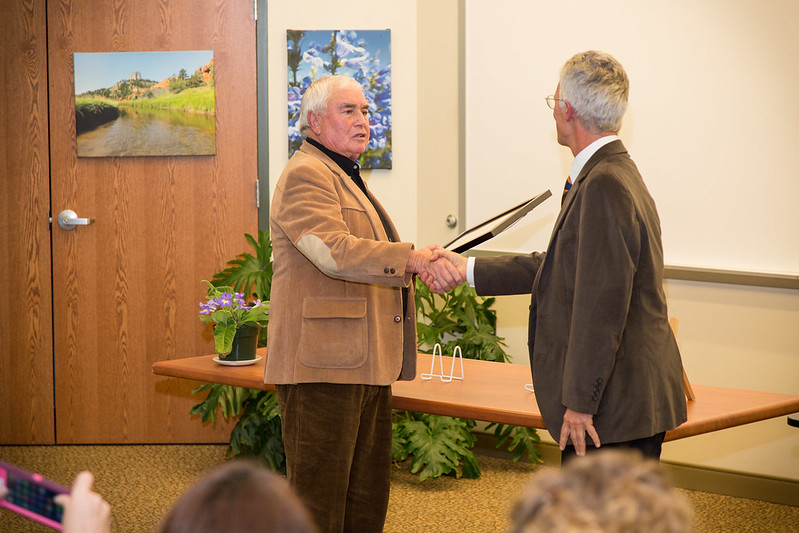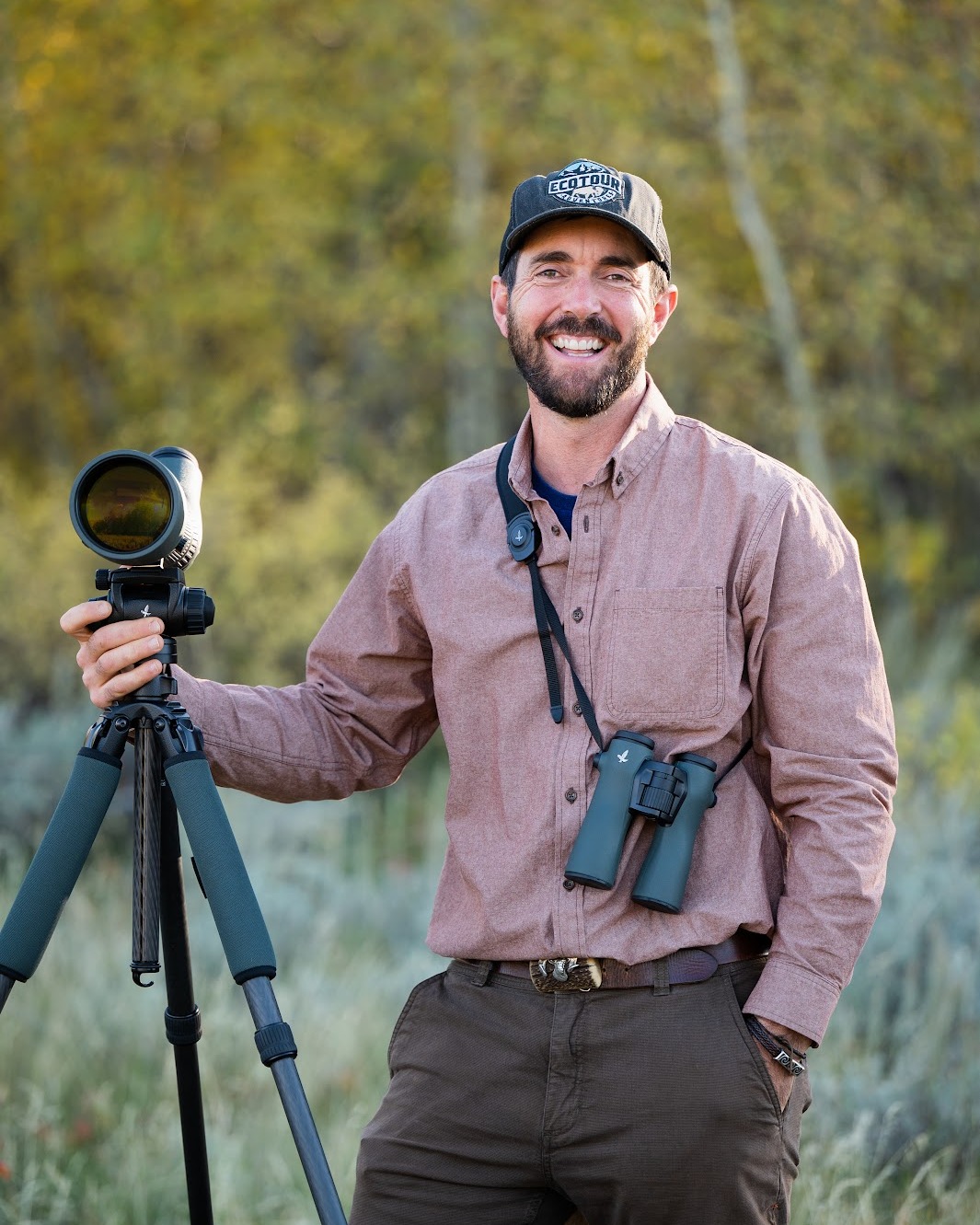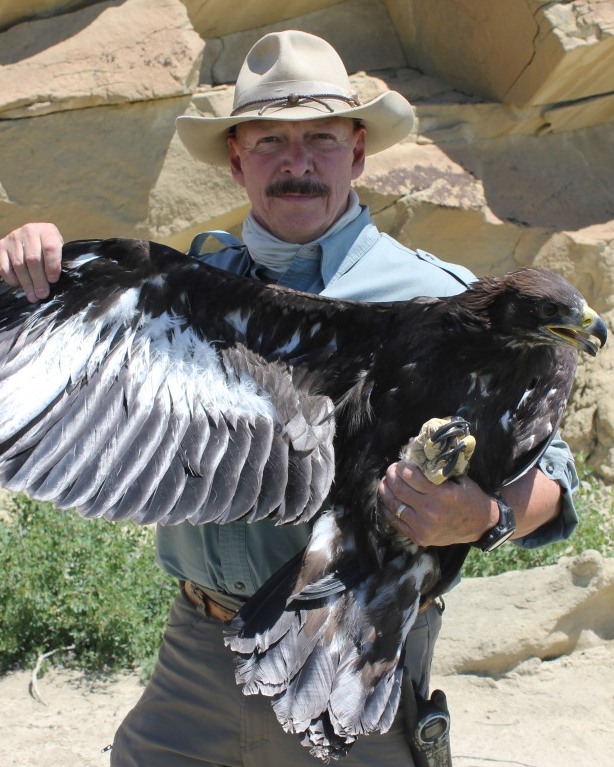Biodiversity Contributions Awards

Award Categories
Biodiversity Science Award: Individuals or group of individuals who have made significant contributions to biodiversity science in Wyoming.
Biodiversity Conservation Award: Individuals or group of individuals who have accomplished notable work to improve biodiversity conservation in Wyoming.
Richard Baldes accepting the Biodiversity Conservation Award in 2015.
2024 AWARDS CEREMONY
Join us in celebrating the exceptional lifelong achievements of Dr. Charles Preston and Taylor Phillips at an awards ceremony on the evening of September 13 at the University of Wyoming Berry Center in Laramie.
2023 AWARD RECIPIENTS


In 2008, Taylor founded EcoTour Adventures, aiming to raise public awareness about the importance of preserving Wyoming's diverse habitats and species, and since educating over 50,000 visitors. To date, EcoTour Adventures has donated over $165,000 to local and national non-profit organizations that are putting effort into the conservation of the Greater Yellowstone Ecosystem. As one of the first wildlife tourism providers in the U.S., Jackson Hole EcoTours has become the industry leader in environmentally friendly and ethical wildlife education for the public. It still stands today as the model almost all other wildlife companies aspire to emulate.
In 2021, Taylor established the WYldlife for Tomorrow initiative, which encourages businesses and individuals benefiting from Wyoming's wildlife to invest in conservation efforts directly. Taylor's work has resulted in the funding of various conservation projects, including highway crossings, wildlife disease and migration studies, fish passages, habitat restoration, and sagebrush restoration, among others. In less than 3 years, Wyldlife for Tomorrow has raised over $350,000 and presents a bright future for the funding of conservation and biodiversity research and projects for generations to come. Through his ingenuity and determination, Taylor has pioneered an innovative approach to funding conservation projects and research in Wyoming.


Dr. Preston is the “Willis McDonald, IV Founding and Senior Curator Emeritus” at the Draper Natural History Museum at the Center of the West. He retired from the Center in 2018 after garnering international recognition for his “visionary” design and development of the Draper Museum and forging a groundbreaking partnership with the Prince Albert II of Monaco Foundation to foster biodiversity conservation in Greater Yellowstone. He established the Draper Museum Raptor Experience in 2011.
Since 2009 he has directed a long-term monitoring and research platform on Golden Eagle nesting ecology in Wyoming’s Bighorn Basin and continues to co-direct as a Research Associate with Teton Raptor Center. Preston and Penny, his wife of 49 years, now split their time between Wapiti, WY, and the Ozark Highlands of Arkansas, where Preston has partnered with a team to establish a new natural history museum and arboretum focused on Ozark ecology. He continues to write, lecture, and consult widely in his Emeritus role with the Draper Natural History Museum.
PAST AWARD RECIPIENTS
2019: Dennis Knight & Duane Keown
A scientist and an educator who have enhanced the knowledge and conservation of biological diversity in Wyoming will receive lifetime achievement awards from the University of Wyoming’s Biodiversity Institute.
The lifetime work of Dennis Knight and Duane Keown will be honored at an award ceremony Friday, Nov. 8, at the UW Berry Biodiversity Conservation Center.
Brent Ewers, director of the UW Biodiversity Institute, along with representatives of the award winners’ nominating committees and members of the community, will distribute the awards to Knight and Keown at 6 p.m. The award ceremony, expected to last until 7 p.m., is open to the public. A meet and greet at 5:30 p.m. and a reception following the ceremony will be in the Berry Center.
“We welcome anyone who has been touched by Dennis’ or Duane’s work to attend the ceremony,” Ewers says. “These two individuals are cornerstones to biodiversity science and conservation, and showing your support and appreciation will make the award ceremony an even more special experience.”
Knight will receive the Contributions to Biodiversity Science Award, which acknowledges his achievements in the field of vegetation ecology. Knight’s research laid the foundation for the understanding of Wyoming’s ecology and biological diversity; his insightful analyses and discoveries in plant ecology, set forth in scientific papers and reports for managers and state agencies, have enabled prudent and informed management of the state’s natural resources for many decades.
His discoveries and syntheses were made available to a broad audience through his 1994 book, “Mountains and Plains,” revised and expanded in 2014 with additional authors. In addition, Knight inspired and mentored a generation of students to become leaders in research and management of the state’s rich biological heritage.
Keown is the recipient of the Contributions to Biodiversity Conservation Award, for his commitment to conservation education in Wyoming. Keown devoted much of his professional career to developing, piloting and revising effective educational strategies to prepare young citizens to make prudent, informed decisions about the future use and management of natural resources.
During his tenure as director of the Wyoming Conservation Center, Keown spearheaded the development of the aptly titled “Wild, Wonderful Wyoming: Choices for the Future” curriculum materials to make conservation education accessible to all K-12 classrooms. The teacher participants, who, in turn, have passed on their knowledge to their students, have multiplied the impact of Keown’s work many times to reach thousands of students across Wyoming.
“We are excited to honor Dennis Knight and Duane Keown with the Contributions to Biodiversity Science and Conservation Awards,” Ewers says. “Their research, mentorship and publications have changed the way biodiversity conservation is understood within Wyoming, and well beyond.”
The Biodiversity Science and Conservation Awards were created in 2013 to publicly thank individuals who have dedicated their lives to increasing public and professional understanding, appreciation and conservation of biological diversity in Wyoming. They are distributed in odd-number years.
Previous winners of the Contributions to Biodiversity Science Award are Bob and Jane Dorn (2013), Wayne Hubert (2015) and Ron Hartman (2017). Previous winners of the Contributions to Biodiversity Conservation Award are Chris Madsen (2013), Richard Baldes (2015), and Fred and Stephanie Lindzey (2017).
The UW Biodiversity Institute works to foster the understanding, appreciation and conservation of biological diversity through innovative research, education and outreach, and by engaging a broad audience in the scientific process. In this setting, scientists and citizens, students and educators come together to share a wealth of perspectives on the study and appreciation of biodiversity -- from microbes to poetry and ecosystems to economics.
For more information about the Biodiversity Institute and the Biodiversity Science and Conservation Awards, visit www.wyobiodiversity.org.
2017: Ron Hartman & Fred and Stephanie Lindzey
The University of Wyoming’s Biodiversity Institute presented lifetime achievement awards to Ron Hartman, of Laramie, and Fred and Stephanie Lindzey, of Centennial, during an award ceremony September 28th, 2017, at the UW Berry Biodiversity Conservation Center.
As the curator of the Rocky Mountain Herbarium since 1977, Ronald Hartman built the organization into an institution befitting the grandeur of the Rocky Mountains, ranking in the top 2% of herbaria across the nation and in the world. His prodigious, systematic fieldwork documented more plant specimens from Wyoming than any other person is likely to ever amass in a lifetime (93,393 specimens). He championed 50 (total) UW graduate studies in floristic inventories, a flagship for graduate training in botany, in which 22 graduate students conducted their work in Wyoming. His vascular flora work represents the largest and most detailed body of biodiversity information for any group of macro-organisms in Wyoming and the Rocky Mountains. He is a taxonomic authority who published over 100 peer-reviewed articles and taxonomic treatments, described over two dozen new species, has been a major contributor to national initiatives such as the Flora of North America project, and he has enhanced the legacy of Aven Nelson who put RM at the hub of documenting botanical diversity in the state and region. He has been a key supporter of technological advances that make biodiversity records widely available, such as on-line specimen databases and specimen images. Hartman’s work started before “biodiversity” became a topic of biological interest and environmental attention, leaving a lasting legacy and window into the flora and landscapes of Wyoming and the western United States.
Since moving to Wyoming in 1985, Fred and Stephanie Lindzey have promoted biodiversity conservation in a myriad of ways. Their contributions include Fred’s tenure as a researcher in the Wyoming Cooperative Fish and Wildlife Research Unit and his time as a Wyoming Game and Fish Commissioner, their participation in USFWS’ private lands Safe Harbor program to reintroduce the critically endangered Wyoming toad, and their property’s designation as a MAPS (Monitoring Avian Productivity and Survivorship) site for almost 20 years. Currently, the Lindzeys are leading the charge to establish a corridor of conservation easements along the Little Laramie River, providing wildlife in the Laramie Basin with a stretch of well-managed, contiguous habitat. Last, but most definitely not least, the Lindzeys willingness to open up their property to University of Wyoming undergraduate classes and graduate projects over the years has supported the education of countless future natural resource professionals in the state. During his career, Fred authored over 100 peer-reviewed articles, book chapters, and reports on species including mountain lions, moose, pronghorn, swift fox, elk, mule deer, black bears, and grizzly bears and mentored 35 graduate students, many of whom still work in the intermountain west today. Throughout Fred’s career, Stephanie earned the titles of biologist and conservationist in her own right. She has been instrumental in welcoming groups of citizens and biologists onto their ranch near Centennial to allow the public to view and interact with Wyoming’s wildlife on one of the most beautiful private properties in the state.
Ron Hartman and Fred and Stephanie Lindzey, were nominated by individuals from around the state and beyond, and selected by a panel of biodiversity experts from throughout Wyoming and representing university, private and public sectors. The award was created in 2013 to publicly thank individuals who have dedicated their lives to increasing public and professional understanding, appreciation and conservation of biological diversity in Wyoming. It is distributed in odd-number years. The inaugural awardees were Chris Madson, of Cheyenne (Biodiversity Conservation Award) and Bob and Jane Dorn, of Lingle (Biodiversity Science Award). 2015 awardees were Richard Baldes of Fort Washakie (Conservation) and Wayne Hubert, Laramie (Science).
The UW Biodiversity Institute works to foster the understanding, appreciation and conservation of biological diversity through innovative research, education, outreach and by engaging a broad audience in the scientific process. In this setting, scientists and citizens, students and educators, come together to share a wealth of perspectives on the study and appreciation of biodiversity -- from microbes to poetry and ecosystems to economics.
For more information about the Biodiversity Institute and the Biodiversity Science and Conservation Awards, visit www.wyobiodiversity.org.
2015: Richard Baldes & Wayne Hubert
The University of Wyoming’s Biodiversity Institute will present lifetime achievement awards to Richard Baldes, of Fort Washakie, and Wayne Hubert, of Laramie, during an award ceremony Wednesday, Nov. 18, at the UW Berry Biodiversity Conservation Center.
The ceremony will begin with a meet and greet at 5 p.m., followed by the presentation from 5:30-6:30 p.m. The awards will celebrate their commitment to enhancing knowledge and conservation of biological diversity in Wyoming.
Baldes will receive the Contributions to Wyoming Biodiversity Conservation Award, which acknowledges his extensive work to protect and preserve the wildlife, fisheries and water resources of the state, Eastern Shoshone and Northern Arapaho Tribes and the nation. As an employee of the U.S. Fish and Wildlife Service (USFWS) for 25 years, he implemented numerous conservation efforts.
After leaving the USFWS, Baldes served on the boards of the National Wildlife Federation, Greater Yellowstone Coalition and the Yellowstone to Yukon conservation initiative. He spent 15 years developing and implementing strategies for conserving special places such as the Greater Yellowstone Ecosystem. He continues today as a founding member of the Wind River Alliance, a member of the Wind River Water Control Board.
Hubert will receive the Contributions to Wyoming Biodiversity Science Award, which acknowledges his lifetime commitment to public education and his contributions to understanding of biodiversity science in the fields of aquatic ecology and fisheries biology.
A professor emeritus in the UW Department of Zoology and Physiology, Hubert has written and edited numerous articles, several books and publications, including “Inland Fisheries Management in North America.” His research addresses important topics in biodiversity science including fish habitat use and movement, invasive species and the effects of habitat fragmentation. While scientific research has been his forte, he also has excelled in the management, conservation and public education aspects of biodiversity science, working closely with numerous agencies, groups and students.
The pair were nominated by individuals from around the state and beyond, and selected by a panel of biodiversity experts from throughout Wyoming and representing university, private and public sectors. The award was created in 2013 to publicly thank individuals who have dedicated their lives to increasing public and professional understanding, appreciation and conservation of biological diversity in Wyoming. It is distributed in odd-number years. The inaugural awardees were Chris Madson, of Cheyenne, Biodiversity Conservation Award; and Bob and Jane Dorn, of Lingle; Biodiversity Science Award.
“Richard Baldes and Wayne Hubert both have influenced so many through their service, mentorship and research both within Wyoming and the entire United States, and we are pleased to honor them with these awards,” says Carlos Martinez del Rio, director of the UW Biodiversity Institute. “We welcome anyone who has been touched by Richard’s or Wayne’s work to attend the ceremony. These two individuals are cornerstones to biodiversity science and conservation, and showing your support and appreciation will make the award ceremony an even more special experience.”
The UW Biodiversity Institute works to foster the understanding, appreciation and conservation of biological diversity through innovative research, education, outreach and by engaging a broad audience in the scientific process. In this setting, scientists and citizens, students and educators, come together to share a wealth of perspectives on the study and appreciation of biodiversity -- from microbes to poetry and ecosystems to economics.
For more information about the Biodiversity Institute and the Biodiversity Science and Conservation Awards, visit www.wyobiodiversity.org.
2013: Robert and Jane Dorn & Chris Madson
Robert and Jane Dorn and Chris Madson have received inaugural lifetime achievement awards from the University of Wyoming Biodiversity Institute. They will be honored Wednesday, Oct. 16, at 5:30 p.m. at the UW Berry Biodiversity Conservation Center.
The Dorns, both from Lingle, will receive the Contributions to Biodiversity Science Award, which acknowledges their lifetime extensive research of plants and birds from Wyoming and the Rocky Mountain region. The Dorns’ publications on botany and ornithology are among the most widely used technical references for natural resource managers, field biologists and the public in Wyoming. Their work includes 22 books (or book chapters), including the Wyoming botanist’s bible, “The Vascular Plants of Wyoming,” and at least 23 articles and 26 technical reports.
Editor of the award-winning magazine “Wyoming Wildlife,” Madson, from Cheyenne, will receive the Contributions to Biodiversity Conservation Award, for his lifetime commitment to public education on Wyoming’s plants, animals and ecosystems.
“It is so appropriate, and so touching, that Bob and Jane Dorn and Chris Madson won the first Contributions to Biodiversity Science and Conservation awards,” says Carlos Martinez del Rio, UW Biodiversity Institute director. “They have truly revolutionized how we study and think about biodiversity in this state, and all of us -- not just ‘us’ from the Biodiversity Institute, but from all over Wyoming -- are grateful for their dedication and passion.”
The three were nominated by individuals from around the state and beyond, then selected by a panel of biodiversity experts from throughout Wyoming.
“We welcome anyone who has been touched by Bob’s, Jane’s or Chris’s work to attend the ceremony,” Martinez del Rio says. “These three individuals are cornerstones to biodiversity science and conservation, and showing your support and appreciation will make the award ceremony an even more special experience.”
A division of the UW Haub School of Environment and Natural Resources, the Biodiversity Institute works to foster the understanding, appreciation and conservation of biological diversity through innovative research, education and outreach; and by engaging a broad audience in the scientific process.
Nominations are closed
Award Categories and Requirements
Biodiversity Science Award: Individuals or group of individuals who have made significant contributions to biodiversity science in Wyoming.
Biodiversity Conservation Award: Individuals or group of individuals who have accomplished notable work to improve biodiversity conservation in Wyoming.
How to Nominate a Candidate
- Submitters may nominate multiple individuals, but each nomination must be submitted as a separate nomination packet.
- The nomination packet must include:
- Nomination cover form (download here)
- A description of the nominee’s career, emphasizing their contributions to biodiversity science, management, conservation, and/or public education in Wyoming, and justification for why this individual/team/organization deserves this award. Limit: 1500 words.
- One letter of support (Limit per letter: 800 words) and contact information for an additional reference.
- Submit the nomination packet as one single PDF document to the Biodiversity Institute, biodiversity@uwyo.edu by 5:00 pm MT, December 20, 2023. Please send your email with subject line “Biodiversity Contributions Award Nomination”.
Timeline
A panel of reviewers will be assembled to assess the nominees’ contributions to Wyoming’s biodiversity science and conservation after the December 20th nomination deadline. We expect to announce awardees by mid-January 2024 and host the award banquet in February 2024.
Contact Information
Please contact Brett Addis (baddis@uwyo.edu, 307-766-6279, Berry Center 231b) with any questions regarding the award nomination process.


